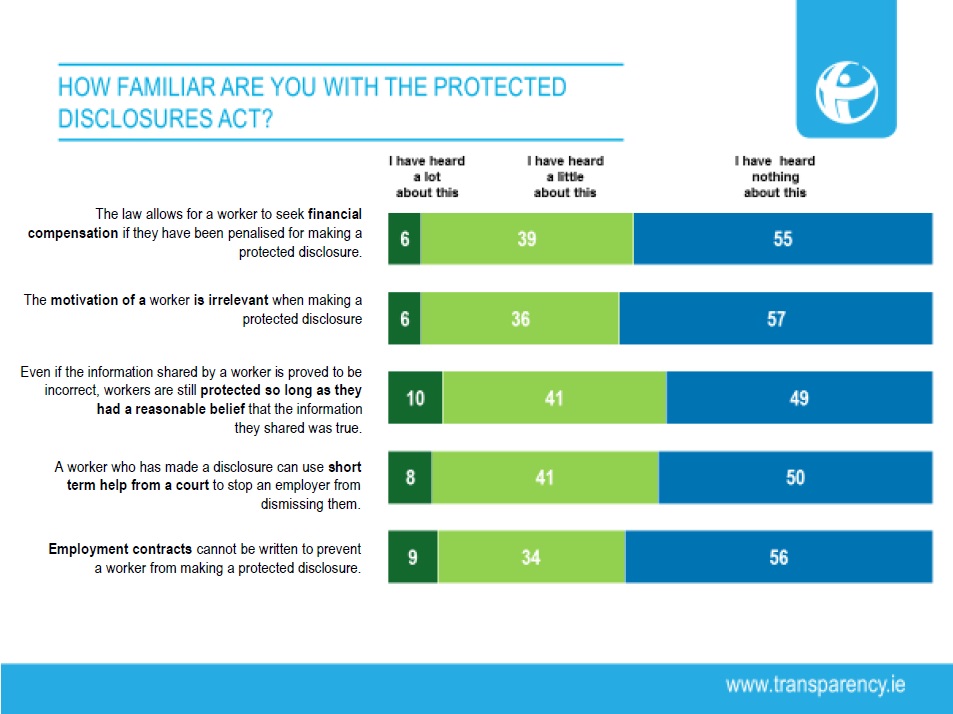Minister Paschal Donohoe launches Integrity at Work initiative and Transparency Legal Advice Centre
Dublin, 22 September 2016
The first set of results of a Behaviour & Attitudes survey conducted on behalf of Transparency International (TI) Ireland indicate that the vast majority of Irish employers are supportive of whistleblowing but indicate that more needs to be done to raise awareness of legislation introduced in 2014 aimed at protecting whistleblowers. Most employers surveyed also said they did not have any procedures in place to channel reports from their staff or to protect those who speak up.
The Integrity at Work Survey is part of a new programme launched today by the Minister for Public Expenditure and Reform, Paschal Donohoe T.D., which is aimed at promoting safer working environments for people who speak up about wrongdoing.
More than nine out of ten [95%] employers said that it is in the interests of their organisation or industry sector for people to speak up about wrongdoing. The number of employers supporting staff that reveal confidential information drops slightly to 91%. A smaller number [79%] say that they would hire or consider hiring someone who had blown the whistle on wrongdoing in a previous job. However, only 64% would encourage an employee to report wrongdoing where the disclosure might harm the reputation of their organisation. The survey also indicates that the majority of employers [66%] have no procedures or policies in place to protect whistleblowers or to channel their reports to the appropriate person.
Commenting on the results of the survey, Minister Donohoe said: ‘It’s encouraging to see that employers have a generally positive outlook on whistleblowing. Nevertheless, these results suggest that much more needs to be done to raise awareness of the Protected Disclosures Act and to ensure that organisations have measures in place to act on reports from their staff and make sure that whistle-blowers don’t suffer as a result of their disclosures. A primary aim of the legislative framework that the Government put in place for Protected Disclosures in 2014 is to ensure that workers feel safe when speaking up’.
Of the 68% of employers that are aware of the PDA, most& are not aware of the specific provisions the legislation contains. For example, 55% do not know that the law allows for a worker to seek financial compensation if they have been penalised for making a protected disclosure, while 57% do not know that the motivation of a worker is irrelevant when making a protected disclosure. Half of all employers [50%] did not know that a worker who has made a disclosure can now seek a court order to stop an employer from dismissing them on account of having made the disclosure. 56% of employers did not know that employment contracts cannot be written to prevent a worker from making a protected disclosure.
The survey also shows that organisations need to work on assuring their staff that reports of wrongdoing will be acted upon and whistleblowers will be protected. Although 93% of employers state that a report of wrongdoing would be acted upon and their staff would not suffer as a result of doing so, less than half of all employees said they felt safe reporting a concern or believed that their reports would be acted on by their employer.
‘There seems to be a gap in levels of trust among employers and employees that wrongdoing will be acted on or that workers will be safe when speaking up. Our initial findings as well as international data show that these are the two most common reasons why people don’t speak up when they see wrongdoing. This gap in trust, combined with relatively low levels of awareness of the PDA, and the lack of workplace procedures, are key reasons why we are launching the Integrity at Work initiative and the Transparency Legal Advice Centre’, said John Devitt, Chief Executive of TI Ireland.
The aim of the ‘Integrity at Work’ (IAW) initiative is to promote positive cultural change within Irish workplaces and implement the broader policy intentions of the PDA by engaging employers, employees, trade unions, and regulators in a number of ways:
- Committing employers to protect workers who report concerns about risk and wrongdoing and assure them that their concerns will be acted upon;
- Bringing stakeholders together at twice yearly forums and an annual conference, to share best practice in promoting ethical workplaces;
- Raising their awareness of the PDA, as well as the availability of free legal advice for their workers from the Transparency Legal Advice Centre (TLAC).
Funding of €300,000 has been provided by the Department of Public Expenditure and Reform in 2016 to seed fund the initiative.
TLAC is an independent law centre that provides free specialist legal advice to people who have made disclosures of wrongdoing or are considering doing so. It is a registered charity and regulated as an independent law centre by the Law Society of Ireland. It has been established and is supported by TI Ireland. The law centre offers legal advice as appropriate to callers to the Speak Up helpline, which was launched in May 2011 and has provided advice and support to over 800 people to date.
The Integrity at Work Survey is aimed at setting a benchmark that will help measure the impact of PDA as well as awareness and capacity building programmes for employers and employees. Future polling will take place every two years to measure progress from 2016. The complete findings of the 2016 survey will be published this December.
The Integrity at Work Survey is the first national survey of attitudes to, and experiences of, whistleblowing among employers and employees in Ireland. The survey was conducted between July and September 2016, with 450 employees and 350 employers polled by Behaviour & Attitudes. An additional 450 employees have been surveyed but the results from the second poll have yet to be analysed. The complete results of the employee and employer surveys will be published in December 2016.
Ends (See Notes)
Notes
Key preliminary findings of the Integrity at Work Survey 2016
Employers are generally supportive of whistleblowing:
- 95% of employers agree (strongly or slightly) that it is in the interests of their organisation or industry sector [business, government, non-profit] for people to speak up about wrongdoing.
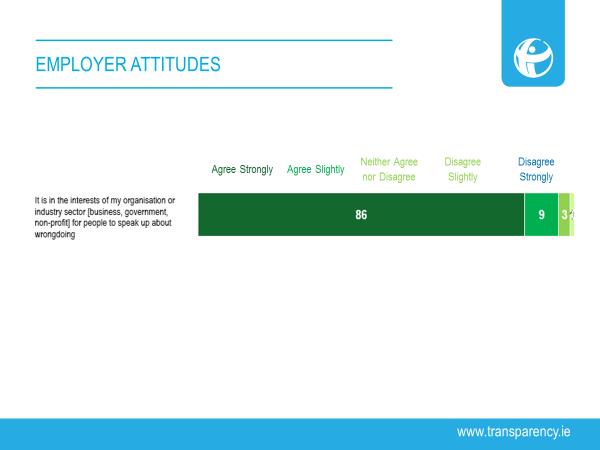
- 91% of employers think employees should be supported if they do make a disclosure, even if they reveal confidential information.
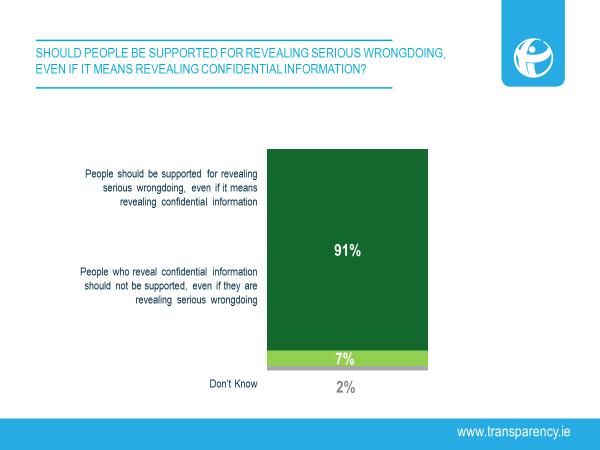
- Although 93% of employers indicate that they are confident that a report of wrongdoing would be acted upon and their staff would not suffer as a result of doing so, less than half of all employees said they felt safe reporting a concern or believed that their reports would be acted on by their employer.
- 79% of employers indicate that they would either hire someone or consider hiring someone who had blown the whistle on wrongdoing in a previous job.
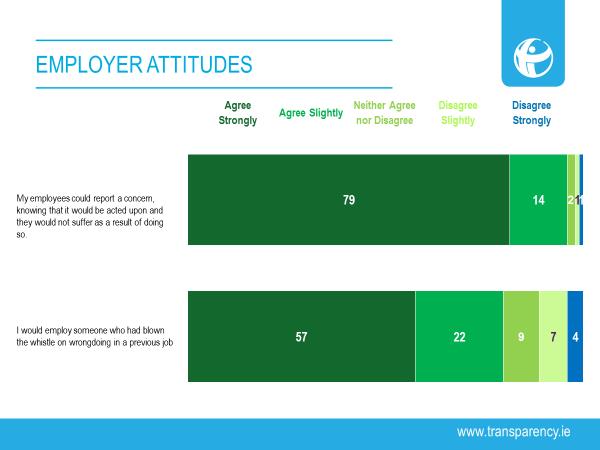
Support for whistleblowing among employers is less certain when employers are asked if they would encourage an employee to report wrongdoing where the disclosure might harm the reputation of their organisation. Only 64% said they would be either very likely or fairly likely to do so.
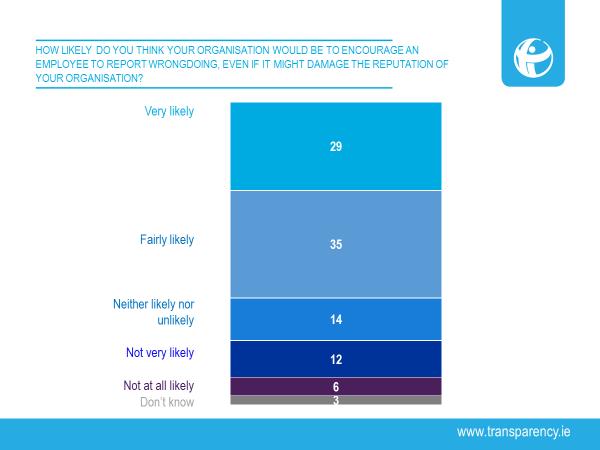
Organisations need to work on assuring their staff that reports of wrongdoing will be acted upon and whistleblowers will be protected. 66% of employers said they had no procedures or policies in place
- Of the remaining 34% of employers that have introduced procedures:
- 10% said they had a whistleblowing policy or guidance in place for their workers
- 16% have a whistleblowing hotline or responsible person to receive reports
- 16% provide access to legal advice on reporting a concern or information about where advice could be obtained.
- 22% provide the names of any external bodies/organisations to whom you can report concerns or seek advice
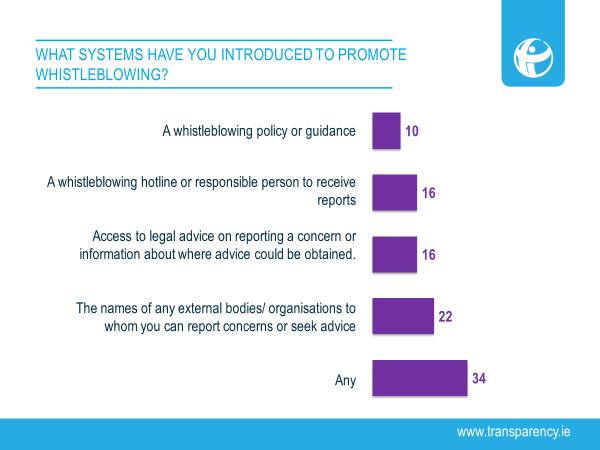
Most employers have a limited understanding of the PDA and more needs to be done to promote awareness of it.
For example:
- 68% of employers state that they are aware of the law, but when asked about the details, most are not aware of the specific provisions the legislation contains.
- 55% do not know that the law allows for a worker to seek financial compensation if they have been penalised for making a protected disclosure.
- 57% do not know that the motivation of a worker is irrelevant when making a disclosure.
- 49% do not know that even if the information shared by a worker is proved to be incorrect, workers are still protected so long as they had a reasonable belief that the information they shared was true.
- 50% do not know that a worker who has made a disclosure can use short term help from a court to stop an employer from dismissing them.
- 56% do not know that employment contracts cannot be written to prevent a worker from making a protected disclosure.
